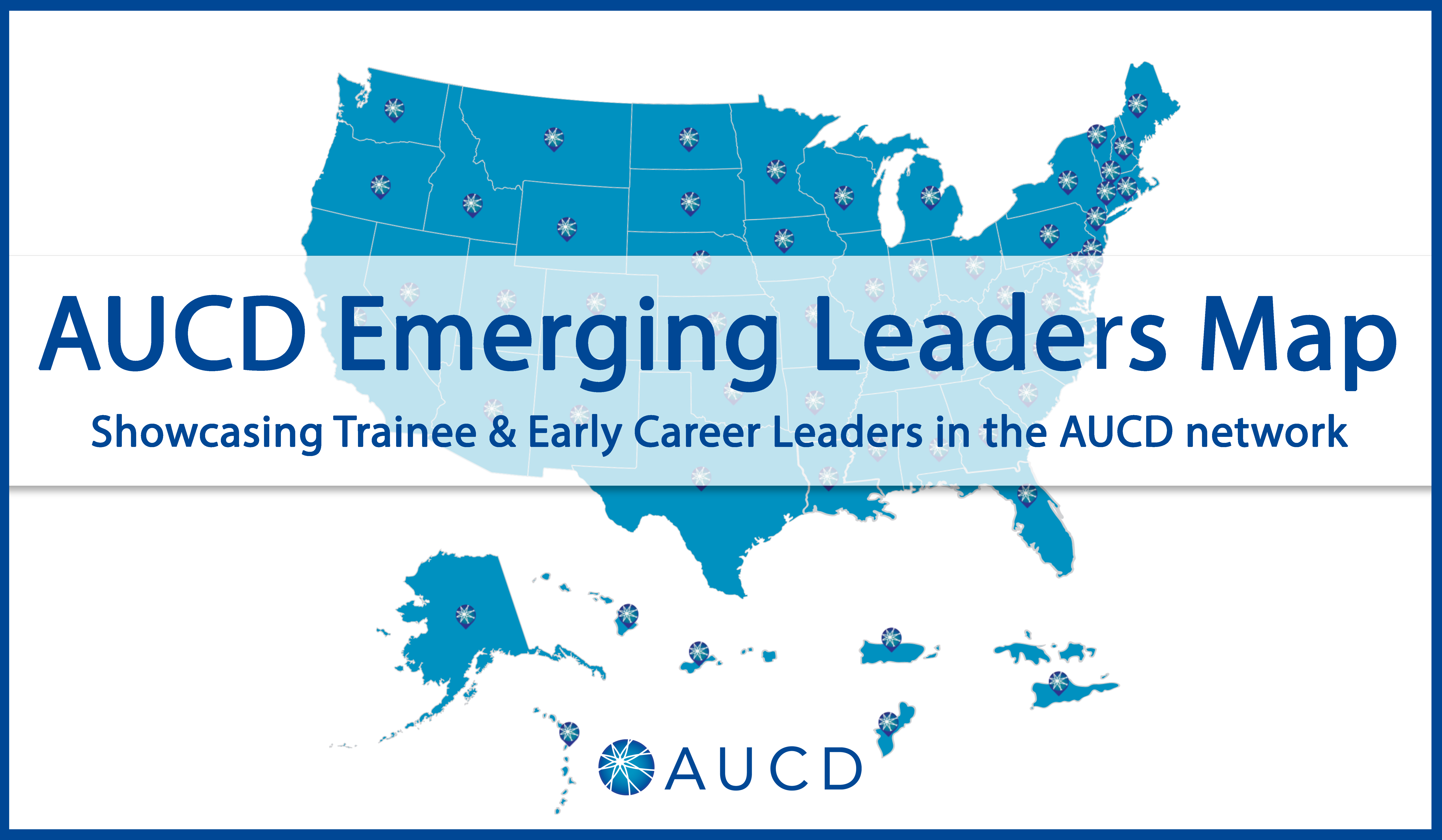
The AUCD Emerging Leaders Map highlights the contributions of diverse trainees across AUCD's network. The theme of this year’s map is "Enhancing Access: Opening Doors with and for People with Disabilities." We feel that ‘Access’ can be defined in many ways, whether it is access to appropriate medical care and/or evaluations, mental health and community services, jobs, access to new research projects or creating accessible spaces. Our hope for this year’s map is to showcase the many diverse ways that emerging leaders are working to enhance access for people with disabilities and facilitate dialogue and collaboration between centers. You can click the pins in each state to learn about the different programs and centers, as well as the activities that trainees are involved in. The Emerging Leaders Map is a great way to explore ongoing activities in the network, to brainstorm ideas for your program or center, and to use as a networking resource for future opportunities!
Questions about the AUCD Emerging Leaders Map should be directed to AUCD's Maureen Johnson.
AZ: Sonoran UCEDD,
Mariana Teposte
CA: The Northern CA LEND Project,
Ryan Taylor
CO: JFK Partners University of Colorado,
Katherine Pickard
FL: Mailman Center for Child Development,
Melissa Liddle
FL: Florida Center for Inclusive Communities,
Nicholas Scheel
GA: Institute of Human Development and Disability,
Emily Starnes Bridges
KA: Kansas University Center on Developmental Disabilities,
Hunter Matusevich
KY: University of Kentucky Human Development Institute,
Danielle Augustin
MA: Institute for Community Inclusion,
Cristina Cortez
MI: Michigan LEND,
Tiffany Munzer
MS: Institute for Disability Studies: Mississippi's UCEDD,
Sara Sorrell
MT: The Rural Institute for Inclusive Communities,
Jackie Mohler
NJ: The Boggs Center on Developmental Disabilities,
OH: Nisonger Center,
Kristin Dell'Armo
OH: Cincinnati Children's Hospital and the University of Cincinnati LEND,
Kristen Groseclose
TN: Vanderbilt Consortium LEND,
Gianna Petrelli
UT: Utah Regional LEND,
Olivia Lebens
VA: VA-LEND,
Katherine Brendli
VT: Vermont LEND,
Michelle Cook
WY: Wyoming Institue for Disabilities,
Ethan Dahl
Kristen Groseclose
Discipline: Family
Cincinnati Children's Hospital and the University of Cincinnati LEND (OH)

Image Description: Woman with short blond hair in a blue shirt smiling straight at the camera. She is wearing pink lipstick and a silver necklace.
1. What does access mean to you?
Access means that everyone has the opportunity to participate--not just those for whom it is easier to serve. I think about access a lot because my son has significant developmental disabilities and I’ve had to advocate on his behalf many times to have organizations consider not only his needs but also everyone who needs more help in navigating our world. Every individual should have the opportunity, regardless of their ability, to lead a life comprised of dignity and joy.
2. How are you working to improve access for and with individuals with disabilities?
I am the president of the newly formed Smith-Kingsmore Syndrome Foundation, a nonprofit created to support children with this rare genetic anomaly as well as their families. Many children with SKS have seizures and sleep issues in addition to other developmental challenges. Our foundation is committed to spreading awareness as well as funding to support medical research and collaboration among medical professionals to help improve the children’s quality of life.
3. What are your goals for the future?
My goal for the future is to continue to identify future leaders within the Smith-Kingsmore Syndrome community and to identify opportunities for them to shine in their areas of expertise. I wish to lead Smith-Kingsmore Syndrome Foundation with love and kindness. The organization’s mission is larger than what one person can achieve alone and it’s not about one person’s success anyway, because then that’s ego. So my main goal is to create systems within our nonprofit that emphasize a culture of working towards the greater good.
4. How can what you learned as an AUCD emerging leader help you achieve those goals?
I think the AUCD experience allows me to be more aware of instances where access is limited or the environment is not set up to support all individuals. I was in my son’s IEP meeting last week and I noticed the loud bells that screamed through the intercom to signify a class period end. I spoke up and asked if the volume of the bells could be lowered in the MD classroom. Even though my son is not bothered by loud noises, I understood how traumatic this could be for others. This small instance is just one example of how my training has allowed me to notice issues I might have missed before.
Cynthia Thielen
Discipline: Self-Advocacy
NH-ME LEND program (NH)
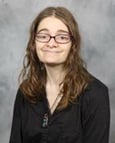
Image Description: Cynthia smiles at the camera and is against a gray background. She is wearing glasses, a black long-sleeved shirt, and a necklace.
1. What does access mean to you?
Access means that people with disabilities are able to participate in the same activities as everyone else and be a part of their communities.
2. How are you working to improve access for and with individuals with disabilities?
As a self-advocate who has earned a Bachelor's degree and started working, I feel like I've helped to improve access for other self-advocates by showing them that they can do the same and that it's not scary.
3. What are your goals for the future?
Working towards becoming an advocate for Supported Decision Making for others trying to be free of guardianship.
4. How can what you learned as an AUCD emerging leader help you achieve those goals?
I’m currently in the process of working towards supported decision making for myself since my guardianship has been in limbo for a few years. I hope to learn about the process first hand so I can help others with the process as well. I've been learning a lot from local advocates and how they work for change at the state level, so I hope to follow in their footsteps.
Melissa Liddle
Discipline: Psychology
Mailman Center for Child Development (FL)
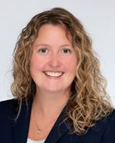 Melissa R. Liddle is a psychology LEND trainee at Mailman Center for Child Development at the University of Miami Miller School of Medicine and a 5th-year graduate student from Xavier University in Cincinnati, Ohio. She received her bachelor's degree in recreation therapy from Indiana University and is a certified child life specialist and recreation therapist. Melissa is interested in the coping and well-being of children and young adults who have both developmental disabilities and chronic health conditions.
Melissa R. Liddle is a psychology LEND trainee at Mailman Center for Child Development at the University of Miami Miller School of Medicine and a 5th-year graduate student from Xavier University in Cincinnati, Ohio. She received her bachelor's degree in recreation therapy from Indiana University and is a certified child life specialist and recreation therapist. Melissa is interested in the coping and well-being of children and young adults who have both developmental disabilities and chronic health conditions.
Image Description: A woman with curly blond hair that ends at her shoulders. She is wearing a black blazer with a white shirt underneath and a silver necklace.
1. What does access mean to you?
The word access carries with it so many meanings. With my educational background, I first think about access to psychological services, which is extremely important to be able to cope with life’s challenges; but this is too narrow in scope. For me, access refers to affordable, meaningful, and feasible opportunities, such as transportation, medical care, recreation, training or education, and meaningful employment (if desired), all which make life worth living and should be available to everyone despite their ability level or socioeconomic status.
2. How are you working to improve access for and with individuals with disabilities?
I have been working to increase access to healthcare for children, adolescents, and young adults who have developmental disabilities and challenging behavior during healthcare experiences. Prior to becoming a psychologist, I worked as a child life specialist with children who had varying levels of difficulty coping with both medical demands and the environment, seeing far too often that despite healthcare provider’s best intentions, parents and children with developmental disabilities are oftentimes unable to receive necessary and life-saving healthcare. My current and future research have focused on understanding the effectiveness of adaptive care plans in medical settings. Adaptive care plans take an alternative, family-centered, approach to ensure that children with developmental disabilities receive safe and appropriate healthcare by increasing communication and collaboration between caregivers and healthcare team members.
3. What are your goals for the future?
I will continue my research and investigate the use of adaptive care plans or other systems that ensure that children, adolescents, and young adults have access to healthcare that meets with psychosocial and behavioral needs. I also plan to provide psychological services (e.g., related to daily living skills, social skills, anxiety, depression) to those with developmental disabilities, including individuals with autism spectrum disorder. Within my provision of care, I hope to foster and support an individual’s own advocacy efforts and also plan to advocate for those with developmental disabilities at a local, state, and national level on causes related to increasing quality of life
4. How can what you learned as an AUCD emerging leader help you achieve those goals?
As an AUCD emerging leader, I have the opportunity to connect with other emerging leaders and professionals with similar passions from around the globe to create comprehensive research and practice changes. Additionally, communication and collaboration for and with individuals with disabilities promote best outcomes for everyone.
Katherine Brendli
Discipline: Special Education and Disability Leadership
VA-LEND (VA)
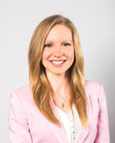 Ms. Katherine (Katie) Brendli is a PhD Candidate, studying Special Education and Disability Leadership at Virginia Commonwealth University (VCU). Ms. Brendli is a Research to Policy Advocacy (RTPA) scholar, funded by an Office of Special Education Programs leadership training grant. Her research interests include self-determination, post-secondary transitions, culturally-responsive practices, and inclusive higher education for individuals with intellectual and developmental disabilities (IDD).
Ms. Katherine (Katie) Brendli is a PhD Candidate, studying Special Education and Disability Leadership at Virginia Commonwealth University (VCU). Ms. Brendli is a Research to Policy Advocacy (RTPA) scholar, funded by an Office of Special Education Programs leadership training grant. Her research interests include self-determination, post-secondary transitions, culturally-responsive practices, and inclusive higher education for individuals with intellectual and developmental disabilities (IDD).
Image Description: A woman with strawberry blonde hair smiling at the camera. She wears a pink blazer with a buttoned white shirt underneath.
1. What does access mean to you?
To me, “access” means “getting what we need” by encouraging equity and inclusion. By doing so, it enables people to do things that many others take for granted. Sometimes it means changing the environment we are in to better meet everyone’s individual needs, but it NEVER means changing the person. To me, it also means giving people of all ability levels the opportunity to engage in conversations impacting our lives.
2. How are you working to improve access for and with individuals with disabilities?
As a PhD candidate, my research involves fostering greater post-secondary outcomes for people with intellectual and developmental disabilities by promoting self-determination/self-advocacy, access to and participation in inclusive higher education, and culturally-responsive practices. My dissertation focuses on encouraging access to accommodations through assisting college students with disabilities in learning their rights to accommodations and how to request/maintain their accommodations from course instructors. I aim to present my research at local, state, national, and international conferences to encourage dialogue and discussions on access and inclusion for people with disabilities. I also engage in policy advocacy in support of access, equity, and inclusion for people with disabilities on a state and federal level.
3. What are your goals for the future?
It is among my many goals to continue to be a disability rights advocate by conducting high quality research, collaborating with relevant stakeholders, and engaging in policy advocacy at the federal, state, and local levels. I hope to continue to make positive contributions to the field and to promote positive post-school outcomes for adults with IDD.
4. How can what you learned as an AUCD emerging leader help you achieve those goals?
Being an AUCD emerging leader has given me the opportunity to collaborate, network, and learn from fellow LEND, UCEDD, and IDDRC professionals nationwide. Among the many things I have learned as an AUCD Emerging leader includes the different activities and initiatives happening at programs across the country, which has inspired me and my fellow peers on the different ways we can further strengthen our program to meet the needs of our community members.
Katherine Pickard
Discipline: Clinical Psychology
JFK Partners University of Colorado (CO)
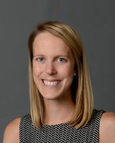 Katherine received her doctorate in clinical psychology from Michigan State University and is now a clinical psychology postdoctoral fellow at JFK Partners, the LEND and UCEDD in Colorado. She is deeply committed to issues of service access and service inequity for individuals with developmental disabilities and their families. At JFK Partners, she provides assessment and intervention to families of individuals with developmental disabilities across the lifespan and values supervision and teaching in these areas. Her areas of clinical strength include parent-mediated interventions and cognitive behavioral therapy for co-occurring anxiety. Katherine's research embodies principles of community engagement and Dissemination and Implementation Science to address issues of service access within diverse community systems, such as the Medicaid, Early Intervention, and public school systems. Specifically, her research has sought to better understand the roots of service barriers and inequities and to address these inequities through thoughtful community partnerships.
Katherine received her doctorate in clinical psychology from Michigan State University and is now a clinical psychology postdoctoral fellow at JFK Partners, the LEND and UCEDD in Colorado. She is deeply committed to issues of service access and service inequity for individuals with developmental disabilities and their families. At JFK Partners, she provides assessment and intervention to families of individuals with developmental disabilities across the lifespan and values supervision and teaching in these areas. Her areas of clinical strength include parent-mediated interventions and cognitive behavioral therapy for co-occurring anxiety. Katherine's research embodies principles of community engagement and Dissemination and Implementation Science to address issues of service access within diverse community systems, such as the Medicaid, Early Intervention, and public school systems. Specifically, her research has sought to better understand the roots of service barriers and inequities and to address these inequities through thoughtful community partnerships.
Image Description: Katherine has shoulder-length blond hair. She smiles at the camera and is against a gray background. She wears a sleeveless black and white patterned dress.
1. What does access mean to you?
To me, access means getting what you need. It’s important to me that access be both equity and that it strives to be just. Equitable access means that families and individuals who experience greater barriers to getting what they need are provided with more support to ensure that they get what they need. It is also important to that we think about the root of why it is hard for some individuals to get what they need and to address the causes of unequal access.
2. How are you working to improve access for and with individuals with disabilities?
My goals have been shaped by a strong desire to address service inequities for families of children with Autism Spectrum Disorders. My research embodies community engagement and Dissemination and Implementation Science to address issues of service access within diverse community systems, such as the Medicaid, Early Intervention, and public-school systems. My research has sought to better understand the roots of service barriers and inequities and to address these inequities through thoughtful community partnerships aimed at intervention translation.
3. What are your goals for the future?
My goals include being actively involved in research, teaching, and advocacy related to the issues outlined above. I am hopeful to continue to supervise, train, and partner with interdisciplinary providers around best practices in supporting individuals with developmental disabilities across the lifespan. I also hope to continue research that is aimed at building our understanding of treatment inequities and the factors that impact how efficiently we move high-quality services into diverse community systems. Additionally, there is significant need to use our existing knowledge to more proactively design research studies in partnership with diverse systems of care, in which we study interventions that are moved into these settings. Doing so would allow us to both support community access to treatment while also understanding the outcomes of improved treatment access for children, families, communities, and larger health systems.
4. How can what you learned as an AUCD emerging leader help you achieve those goals?
Having the opportunity to be a LEND and UCEDD trainee for the past three years has given me a deep understanding of the importance of community partnership and interdisciplinary leadership across providers, families, and self-advocates. Collaborative work in these areas is what fuels meaningful and important changes in community service access.
Ethan Dahl
Discipline: Social Psychology
Wyoming Institue for Disabilities (WY)
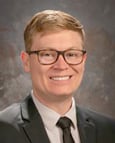 Ethan Dahl is an Assistant Research Scientist at the Wyoming Institute for Disabilities (WIND). He received his doctorate in Experimental Social Psychology from Texas Tech University in 2018 and completed his LEND training fellowship from the Utah Regional LEND in 2019. Ethan’s work is focused on creating more inclusive communities for individuals with disabilities through his research interests of social identity, social exclusion, ostracism, and the intersection of these topics with the health and well-being of individuals with developmental disabilities and their families.
Ethan Dahl is an Assistant Research Scientist at the Wyoming Institute for Disabilities (WIND). He received his doctorate in Experimental Social Psychology from Texas Tech University in 2018 and completed his LEND training fellowship from the Utah Regional LEND in 2019. Ethan’s work is focused on creating more inclusive communities for individuals with disabilities through his research interests of social identity, social exclusion, ostracism, and the intersection of these topics with the health and well-being of individuals with developmental disabilities and their families.
Image Description: Ethan is wearing glasses and smiling at the camera. He is wearing a black suit jacket and white shirt with a black tie. He is against a gray background.
1. What does access mean to you?
I think that all individuals, whether having a disability or not, should have equal rights to access the things that they desire in order to pursue a happy and healthy life. Access as we currently think about it is not just creating opportunities but more importantly about removing barriers any individual may have in accessing the opportunity. Whether it be entering a building to attend class, accessing healthcare from one’s own home, or enjoying hobbies like snowshoeing, theatre, or video games; access is about making sure that if an individual wants to participate, they can. Accessibility through the lens of universal design benefits everyone and should be important to all.
2. How are you working to improve access for and with individuals with disabilities?
My work at the Wyoming Institute for Disabilities is focused on individuals with disabilities in rural and frontier areas like Wyoming. Current projects include improving access to a quality education for individuals with Autism by training teachers in behavioral techniques to help keep these students in their classroom and headed towards their educational goals. Additionally, my work with the Wyoming Telehealth Network is focused on improving access to healthcare through the use of telehealth for rural individuals. My research also is focused on individuals with disabilities feeling included in their community, which involves access to social groups and activities.
3. What are your goals for the future?
Our programs at WIND reach a wide audience across education and healthcare. I have a goal of supporting and expanding these programs. I also have a goal to develop a high quality research program that focuses on social inclusion of individuals with disabilities. I want to better understand how individuals with disabilities build their social identities and use this information to create more inclusive rural communities. Issues such as lack of access and opportunities may significantly contribute to inclusion.
4. How can what you learned as an AUCD emerging leader help you achieve those goals?
My time as an AUCD emerging leader has taught me that the challenges we face as a network are multifaceted and require diverse perspectives to overcome. Taking an interdisciplinary approach and understanding what others can bring to the table has helped me shape the way I approach my research goals and questions. Learning what other leaders are interested in and working on will help me achieve my goals by opening collaboration opportunities and providing me access to unique perspectives from the network of emerging leaders. Understanding social inclusion for individuals with disabilities is goal that will require more than my own perspective to understand.
Ashlee Parker
Discipline: Pediatric Occupational Therapy
Waisman Center (WI)
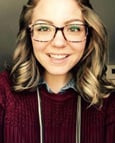 Ashlee Parker is a 2nd year LEND Trainee and MSOT student at the University of Wisconsin-Madison. Ashlee’s passion for this work has roots in her identity as a sibling of two younger brothers with neurodevelopmental disabilities and as the daughter of an individual with physical disabilities. As a first-generation college student and an individual who experienced food insecurity and childhood poverty, Ashlee is determined to help amplify the voices of those who have been marginalized and underserved in order to begin chipping away at the inequities seen in healthcare today.
Ashlee Parker is a 2nd year LEND Trainee and MSOT student at the University of Wisconsin-Madison. Ashlee’s passion for this work has roots in her identity as a sibling of two younger brothers with neurodevelopmental disabilities and as the daughter of an individual with physical disabilities. As a first-generation college student and an individual who experienced food insecurity and childhood poverty, Ashlee is determined to help amplify the voices of those who have been marginalized and underserved in order to begin chipping away at the inequities seen in healthcare today.
Image Description: A woman with glasses smiling straight at the camera. She is wearing a burgundy sweater with a blue collared shirt underneath. She is wearing a long necklace.
1. What does access mean to you?
Access to me means the availability of opportunities, and I strongly believe that access for individuals with disabilities should be unobstructed and equitable. For the WICII (Wisconsin cares integration initiative) project, we are specifically looking at barriers and enablers to accessing the Autism Pathways (screenings, referrals, a diagnosis, and treatments for Autism Spectrum Disorder) for families across WI.
2. How are you working to improve access for and with individuals with disabilities?
The project is part of a quality improvement initiative that aims to uncover the current mechanisms in place that support or hinder families of individuals with disabilities to access the Autism pathway. This is important because in order to improve access to any stage within the Autism pathway, we first need to identify what supports and barriers families are currently experiencing.
3. What are your goals for the future?
My overarching goal for the future is to become a leader in the field of pediatric occupational therapy by promoting collaboration, research, education, and advocacy and working alongside families and individuals with disabilities to create change.
4. How can what you learned as an AUCD emerging leader help you achieve those goals?
Being an emerging leader has offered me the tools I need to promote change on a systems level as well as an individual level by supporting my growth in interdisciplinary care, evidence-based practice, policy, and advocacy. With these tools and with the connections I’ve made in the EL network, I can return to my field and begin to effectively support and empower individuals with disabilities and their families.
Gianna Petrelli
Discipline: Genetic Counseling
Vanderbilt Consortium LEND (TN)
 A native of the Chicago area and a 2019 graduate of DePauw University, Gianna Petrelli is a LEND (Leadership Education in Neurodevelopment and Related Disabilities) trainee at the Vanderbilt Kennedy Center. She is a member of the inaugural class of the Master of Genetic Counseling program at Vanderbilt and has a special interest in exploring ways in which Genetic Counselors can fulfill roles in the public health setting. As a LEND trainee, she has the opportunity to work with the Youth Advisory Council for Tennessee’s Title V CSHCN Program as well as serve as the Trainee Liaison for the Vanderbilt Kennedy Center and AUCD.
A native of the Chicago area and a 2019 graduate of DePauw University, Gianna Petrelli is a LEND (Leadership Education in Neurodevelopment and Related Disabilities) trainee at the Vanderbilt Kennedy Center. She is a member of the inaugural class of the Master of Genetic Counseling program at Vanderbilt and has a special interest in exploring ways in which Genetic Counselors can fulfill roles in the public health setting. As a LEND trainee, she has the opportunity to work with the Youth Advisory Council for Tennessee’s Title V CSHCN Program as well as serve as the Trainee Liaison for the Vanderbilt Kennedy Center and AUCD.
Image Description: A woman with dark brown hair smiling at the camera. She wears a black blazer.
1. What does access mean to you?
To me, access means having available resources tailored to an individual that will aid in achieving the best outcomes regarding physical, social, and mental health. I believe that the responsibility of ensuring access for an individual should not fall on that individual him or herself, but rather should concern interprofessional teams across the realms of health and policy.
2. How are you working to improve access for and with individuals with disabilities?
In my graduate work, I’m currently working on examining barriers to accessing the Undiagnosed Diseases Network (UDN), an NIH-funded project that seeks to provide answers to patients and families that have undergone long diagnostic odysseys. The number one referring specialty is neurology; by examining what barriers patients face to acceptance to the UDN, I hope to provide further understanding to the barriers patients with neurodevelopmental, neuro-regressive, or neurological-based disabilities to receiving a diagnosis. While a diagnosis may not take away or lead to symptoms, diagnoses can open doors to services available for an individual living with a disability.
3. What are your goals for the future?
I am currently pursuing a Master’s of Genetic Counseling degree, and as a practicing genetic counselor, I hope to bridge the gap between personalized medicine and public health. I believe the genetic counseling skillset one gains through training and practice is applicable in the public health world because of the unique opportunities genetic counselors have while working on interdisciplinary teams and understanding the needs and concerns of patients in order to aid in shared decision making with patients. I hope to help genetic counselors understand how these skillsets can transfer from an individual patient to a community or perhaps entire population.
4. How can what you learned as an AUCD emerging leader help you achieve those goals?
I have learned how centers on disabilities, such as the Vanderbilt Kennedy Center, work to create a space in which individuals with disabilities, families, educators, and other service providers can collaborate to research, learn, and disseminate information to a variety of different audiences. I have also learned how many different disability advocacy organizations within a state work to educate and empower individuals and families in all parts of life through the agency visits I have the opportunity to partake in as a LEND trainee.
Emily Starnes Bridges
Discipline: Public Health
Institute of Human Development and Disability (GA)
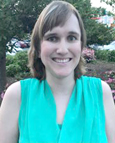 Emily Starnes Bridges has both a Master of Public Health and Disability Studies Certificate from the University of Georgia, along with a Bachelor of Arts in Psychology with a Biological Sciences minor from the University of Tennessee. Her education builds upon rich lived experiences as a self-advocate and sibling, and she hopes to use these qualities in her new home in Ventura County, CA. Some of Emily’s passions in life are improving health equity and access for vulnerable populations, taking part in public speaking and advocacy activities, and spending time with her loved ones.
Emily Starnes Bridges has both a Master of Public Health and Disability Studies Certificate from the University of Georgia, along with a Bachelor of Arts in Psychology with a Biological Sciences minor from the University of Tennessee. Her education builds upon rich lived experiences as a self-advocate and sibling, and she hopes to use these qualities in her new home in Ventura County, CA. Some of Emily’s passions in life are improving health equity and access for vulnerable populations, taking part in public speaking and advocacy activities, and spending time with her loved ones.
Image Description: Emily smiles at the camera wearing a bright cyan blue sleeveless shirt. She has short brown hair and bangs. She is outside with a tree, bushes, and flowers in the background.
1. What does access mean to you?
Access means having needs met, supports obtained, and acceptance occur no matter background, beliefs, and standing in life. When there is full access, people feel like they belong and are understood by people in their communities. Access applies to education, employment, healthcare, and policy, as well as all other aspects of life. Access in its fullest form is everyone taking part in the process. Then advocating for services doesn’t have to be such a long journey, but one of teamwork -- at home, within the greater community, or on the national level.
2. How are you working to improve access for and with individuals with disabilities?
At the University of Georgia (UGA), I taught a health literacy pilot program to students with intellectual disabilities in UGA’s Inclusive Post-Secondary Education Program (Destination Dawgs) as part of my Master of Public Health capstone project. This project helped build the students’ confidence when advocating with their physicians and accessing necessary care. As an intern with AUCD’s public health department last summer, I grew even further in my understanding of access, and I will carry all these deeper perspectives forward in improving access for all.
Since moving across the country to Ventura County, CA last month, my employment pursuits have been with work that focuses on improving various forms of access for people with disabilities, their families, and other underserved populations. As well, volunteerism has always been a part of my life, and I plan to connect with community volunteer opportunities that also support access for people with disabilities.
3. What are your goals for the future?
So much excitement is on the horizon, and I have many goals and dreams – here are just a few!
Working at the intersections of disability, equity, and public health for the betterment of my new community, allowing use of my academic pursuits, skills acquired along the way, and lived experiences and interests.
Getting further involved in public speaking and other community outreach opportunities in Southern California, especially within the realm of health and disability.
Building new professional relationships and friendships (including with my new husband!), while staying connected with family, friends, professors, and professional contacts I’ve had the pleasure of knowing over the years.
4. How can what you learned as an AUCD emerging leader help you achieve those goals?
My time as an emerging leader was a terrific opportunity of expanding my academic understanding in two different fields – public health and disability studies. All the while, this further enriched my advocacy and networking skills, which is so important when interacting with peers at various levels. Not only that, but the time as a UCEDD trainee and AUCD summer intern greatly expanded my circle of connections, allowing me to form lasting, beneficial relationships with people across the country.
Much appreciation and best wishes to everyone in the AUCD network. To the current cohort of trainees, take advantage of everything your current situation offers, especially that of gaining many new collegial friendships.
Danielle Augustin
Discipline: Health Promotion
University of Kentucky Human Development Institute (KY)
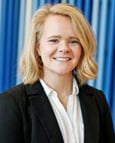 Danielle has her master’s degree in Health Promotion and is the Disability Education Health Coach at the University of Kentucky’s Human Development Institute. As a health coach, Danielle aims to empower individuals with disabilities and their support networks to live a holistically healthy lifestyle which prioritizes the mental, emotional, spiritual, intellectual, sexual, and social aspects of health alongside the physical aspects. As a Type 1 diabetic herself, Danielle is also extremely passionate about making diabetes education, services, and programs fully accessible and inclusive to all individuals as she understands the obstacles faced every day by individuals managing this, and other, chronic conditions.
Danielle has her master’s degree in Health Promotion and is the Disability Education Health Coach at the University of Kentucky’s Human Development Institute. As a health coach, Danielle aims to empower individuals with disabilities and their support networks to live a holistically healthy lifestyle which prioritizes the mental, emotional, spiritual, intellectual, sexual, and social aspects of health alongside the physical aspects. As a Type 1 diabetic herself, Danielle is also extremely passionate about making diabetes education, services, and programs fully accessible and inclusive to all individuals as she understands the obstacles faced every day by individuals managing this, and other, chronic conditions.
Image Description: A woman with shoulder-length blond hair. She wears a black blazer and a white collared shirt underneath. She is standing against a background with multiple shades of blues.
1. What does access mean to you?
To me, access means the ability to get the services and supports needed with the same ease as everyone else without feelings of apprehension, stress, or worry surrounding availability. Often the first thought surrounding access relates to the physical environment, which is certainly an important aspect, however access extends much more broadly. Access means having resources available that are of an appropriate literacy level so you can fully understand the information. Access is feeling safe and heard when seeing a clinician for a health concern. Access is the ability to be part of a community organization without need for additional adaptations or accommodations that may make you feel “othered”.
2. How are you working to improve access for and with individuals with disabilities?
The main avenues in which I improve access for individuals with disabilities is through education, universal design, and advocacy. I work with my team to educate health professionals on disability awareness and etiquette while highlighting access barriers such as health literacy and communication differences. Additionally, my team heavily utilizes the principles and strategies of universal design to help create fully inclusive and accessible health programs, services, and resources from start to finish. Through these efforts I am able to advocate with and for the inclusion of people with disabilities into health programs by both making programs more welcoming to this population, but also connecting individuals with disabilities in the community to inclusive programs.
3. What are your goals for the future?
I want to create a culture shift within the field of public health to acknowledge and include the disability population in conversation, just as other minority populations are acknowledged and included, to meaningfully address the starling health disparities affecting these individuals.
I also plan to utilize my background in health coaching to help build a person-centered approach to health which prioritizes autonomy and self-determination to ignite lasting health behavior change and allow individuals with disabilities to be an active participant in their well-being.
Lastly, I hope to bridge the gap between disability and diabetes. As a Type 1 diabetic, I experience firsthand the struggles individuals with chronic conditions face daily. Managing a chronic condition is difficult enough without the additional barriers individuals with disabilities face such as lack of appropriate diabetes prevention education and false assumptions surrounding inability of individuals to manage their health.
4. How can what you learned as an AUCD emerging leader help you achieve those goals?
The biggest lesson I’ve learned, and continue to learn, as an emerging leader is that nothing meaningful can be done alone. The support from my organization to continue to become an emerging leader has allowed me to strike a balance between being a learner and a doer. I am constantly gaining knowledge and insights from mentors and self-advocates while simultaneously being supported to blaze my own trail. This knowledge and support will allow me to achieve my goals in raising awareness about disability and breaking down access barriers in the health field. I have also learned that working in the disability field means you will be met with a lot of feedback from people who don’t understand our world and our population, but those interactions are but small speed bumps in the great work we do. The ability to continue to fight for the equality of people with disabilities, without discouragement, is both a meaningful skill and a beautiful art.
Lily Yip
Discipline: Family
The Boggs Center on Developmental Disabilities (NJ)
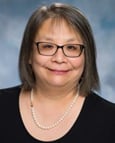 Lily Yip is a mother and co-guardian to two adult children with autism and developmental disabilities. Lily is a graduate of the Partners in Policymaking Program in 2019. Since leaving the corporate world in the field of information technology in 2016, she has been more active in advocacy related to disability policy for adults with developmental disabilities. She joined LEND to continue learning about disability and advocacy. In addition, making connections with professionals and families is very important to Lily.
Lily Yip is a mother and co-guardian to two adult children with autism and developmental disabilities. Lily is a graduate of the Partners in Policymaking Program in 2019. Since leaving the corporate world in the field of information technology in 2016, she has been more active in advocacy related to disability policy for adults with developmental disabilities. She joined LEND to continue learning about disability and advocacy. In addition, making connections with professionals and families is very important to Lily.
Image Description: Lily has bangs and dark gray hair that end at her shoulders. She is wearing a black round neck shirt and a pearl necklace. She is against a light gray background.
1. What does access mean to you?
At the present moment, access to me means knowledge through information and communication. Currently, what's important to me and my family are community services, opportunities for meaningful employment, and home affordability.
2. How are you working to improve access for and with individuals with disabilities?
To learn about services and disability policy, I attend various disability meetings and conferences, was a graduate of Partners in Policymaking in 2019, and currently in the 2019-2020 cohort of LEND. In turn, I share this information with other families as the leader of a local parent support group named New Jersey Parents of Exceptional Adults as well as organize information to share between self-advocates and families. Whenever I get the chance, I keep an open dialogue on the topic of disability with community leaders and members.
3. What are your goals for the future?
My goal for the future is to continue opening doors with and for people with disabilities so that they can reach their full potential and lead purposeful lives. My emphasis is in the areas of housing, employment and social capital.
4. How can what you learned as an AUCD emerging leader help you achieve your goals?
Being on an interdisciplinary team as a LEND fellow and AUCD emerging leader will help me achieve my goals. Mindful listening and meeting people with different leadership styles and learning styles help contribute to working together effectively to achieve a common goal.
Cristina Cortez
Discipline: English and Self-Advocacy
Institute for Community Inclusion (MA)
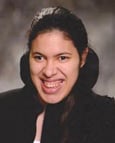 Cristina Cortez is a first-generation Latin-American poet born to immigrant parents. She was a speaker at TEDx Everett (March 2017). Cortez also writes for the United Spinal Association’s New Mobility Magazine: the magazine for active wheelchair users.
Cristina Cortez is a first-generation Latin-American poet born to immigrant parents. She was a speaker at TEDx Everett (March 2017). Cortez also writes for the United Spinal Association’s New Mobility Magazine: the magazine for active wheelchair users.
Image Description: A woman with black hair that is in a ponytail. She has on a black blazer. She is against a gray background.
1. What does access mean to you?
To me, access means the ability to use wheelchairs, public transportation, and audiobooks to engage with the world I live in. These items are technologies that facilitate my mobility, social life, and my ongoing education. My experience with technology is that it can enable a disabled person’s participation in life by enhancing his/her developing and existing abilities. Even though the technologies that exist may not work 100% of the time, they allow people with disabilities to live on their own terms.
2. How are you working to improve access for and with individuals with disabilities?
As a writer, I share my life experiences to show readers that people with disabilities are people, first. My work reveals that individuals have complex identities of which disability is only a part. Currently, I am working on a memoir titled Un-bound and is about the challenges and joys of being a quadriplegic. Life gives all of us two choices: stay down when you are knocked down or get up and seize the day. Through my writing, I want to show others that life is fun when you get back up.
3. What are your goals for the future?
In the near future I aim to publish my memoir, apply for the Gopen fellowship, and later pursue a Ph.D in American Literature. I think these projects will allow me to become a better advocate, since my book deals with the challenges of self-advocacy, with the Gopen fellowship I will be able to develop a project called We Matter After 22 (to deal with the need for disability services for adults), and with the Ph.D I will study the development of civil rights movement literature of the 1960-1980’s.
4. How can what you learned as an AUCD emerging leader help you achieve those goals?
As an AUCD emerging leader, I feel that I have learned a lot from the lectures I have attended during my current LEND Fellowship. More importantly through the lectures I have gained access to the instructors who are professionals in different disability-related fields. The connections I have made are the greatest benefit of being an emerging leader, as Dr. Jason Folger has said, “LEND is a launch pad for careers.”
Ryan Taylor
Discipline: Social Work
The Northern CA LEND Project (CA)
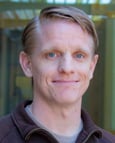 My name is Ryan Taylor. I am a Licensed Clinical Social Worker living and working in Northern California and am currently a 2019-2020 University of California Davis (UC-Davis) MIND Institute LEND trainee. I received a BA degree from the University of Florida and an MSW degree from Saint Louis University. I am married. I am also neurodivergent.
My name is Ryan Taylor. I am a Licensed Clinical Social Worker living and working in Northern California and am currently a 2019-2020 University of California Davis (UC-Davis) MIND Institute LEND trainee. I received a BA degree from the University of Florida and an MSW degree from Saint Louis University. I am married. I am also neurodivergent.
Image Description: A man with light brown hair and blue eyes smiling at the camera. He is wearing a brown zippered jacket.
1. What does access mean to you?
Listening to and valuing neuro/physio/divergent people and their families. Journeying and speaking with and not just for them. Supporting them as they decide/tell/invite us to in improving their quality of life. Educating the broader society about the gifts, talents, contributions, and need for forms of neuro/physio/divergence in our communities and institutions. Learning about and educating others about neurodiversity and incorporating a neurodiversity paradigm as much as possible into professional practice. Working towards a more neurocosmopolitan world as explained by Nick Walker and Ralph Savarese.
2. How are you working to improve access for and with individuals with disabilities?
By living out the answer to the first questions above as best I can, and by always striving to be the best clinical social worker I can be. By continuing to learn more and be formed more by works and teachings of self-advocates, activists, scholars, thinkers, and researchers, and then adjusting my paradigm, perceptions, and practices accordingly.
3. What are your goals for the future?
Here’s a few of the many that come to mind…
Grow ever closer to and more in love with my wife a little more every day, and to be the best and most supportive and loving husband I can be.
Try to learn something new every day
Continue working with/for and supporting autistic people and their families, and communities
I’d love to have a professional life that always involves some aspect of research; clinical work; and community support/education/advocacy.
Pursue doctoral studies and earn a doctoral degree if the opportunity presents itself
Spend time living and working in another country if the opportunity presents itself
I’d like to learn how to play the accordion, and to continue riding motorcycles long into my elderly years.
4. How can what you learned as an AUCD emerging leader help you achieve those goals?
Everything I have learned and experienced as a LEND trainee has contributed towards achieving the goals mentioned above on one way or another to varying degrees. I am so very grateful to the faculty, staff, and fellow students and trainees at the MIND Institute and Northern California LEND program for not only the training and experiences received through the formal curriculum but also for supporting me in pursuit of topics of particular interest to me that were not in the curriculum yet applicable to the greater AUCD and LEND missions. Thank you!
Nicholas Scheel
Discipline: School Psychology
Florida Center for Inclusive Communities (FL)
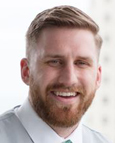
Image Description: A man with short brown hair and a beard smiling at the camera with his top row of teeth showing. He is wearing a gray vest on top of a white collared shirt with a light blue tie.
1. What does access mean to you?
Access is obtaining services and supports in order to meet specific and unique needs. The goal of access is the student is successful in school and in life. However, access goes beyond students obtaining services and supports. It requires available resources including adequate screening systems, staffing and teaming with the appropriate expertise, and programming to best serve all students.
2. How are you working to improve access for and with individuals with disabilities?
I provide mental health services for the 60% of students who “fall through the cracks.” Specifically, I work with students exhibiting serious internalizing problems including depression, anxiety, and suicidal ideation, who would typically not appear on current universal screeners. I also write practice briefs for the US Department of Education on integrating mental health service into PBIS frameworks. Currently, I am writing a brief on integrating a trauma informed approach into a PBIS framework to better support underserved students with trauma.
3. What are your goals for the future?
As a professional in the field of School Psychology, I plan to research the integration of mental health and behavioral services and supports into multi-tiered system of support frameworks to increase accessibility. Specifically, I aspire to better understand the effectiveness of crisis prevention, intervention, and postvention programs, strategies, and supports as they fit within already established behavior, social-emotional, and academic frameworks. My hope is to develop systemic approaches and trainings to create safer school settings and to better identify and serve all students in crisis.
4. How can what you learned as an AUCD emerging leader help you achieve those goals?
I hope to utilize the various resources the community provides to enhance my skills in researching and educating the public in best practices to best meet the needs of all students. Further, I hope to collaborate with the varying disciplines that are a part of the emerging leaders’ community. Integrating and expanding knowledge through an interdisciplinary approach would impact my research as well as student access and service delivery in a variety of setting and situations.
Elnaz Alimi
Discipline: Occupational Therapy
Illinois LEND (IL)
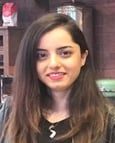 I am an Occupational Therapist and Occupational Therapy Doctoral (OTD) student at University of Illinois at Chicago (UIC). I am interested in promoting culturally sensitive care to better serve marginalized and underserved populations. I would like to spend my spare time doing Yoga, playing Tennis and watching movies.
I am an Occupational Therapist and Occupational Therapy Doctoral (OTD) student at University of Illinois at Chicago (UIC). I am interested in promoting culturally sensitive care to better serve marginalized and underserved populations. I would like to spend my spare time doing Yoga, playing Tennis and watching movies.
Image Description: A woman with long dark brown hair that is lighter at the ends. She smiles at the camera and wears a light mauve lipstick. She wears a black leather jacket with a black shirt underneath and a silver necklace.
1. What does access mean to you?
Personally, access means equity, equality and having the same right for all people to receive the care and resources they need regardless of their nationality, language, socioeconomic status, and ethnicity.
2. How are you working to improve access for and with individuals with disabilities?
I am a volunteer at Heartland Alliance International Marjorie Kovler Center, which is a Chicago based human rights organization that serves survivors of torture. My main role there is Farsi language (and culture) interpretation for clients with limited English proficiency. Also, by partnering with this organization, I am doing a research project to assess the level of social participation and occupational engagement among forcibly migrated people to find out their barriers to access to the resources compared to their citizen counterparts. In addition, my LEND project is focused on language access for Spanish families who have children and youth with special health care needs under the supervision of Dr. Brian Grossman.
3. What are your goals for the future?
As an immigrant health care provider, I am willing to play a role in facilitating health care access for underserved and marginalized populations.
4. How can what you learned as an AUCD emerging leader help you achieve those goals?
I am a LEND fellow and, to be honest, LEND was the most exciting experience I have ever had in my entire educational journey. I had the chance to be among an interdisciplinary team including self-advocates and families. I was lucky enough to engage in hands-on professional experience working with community members, be involved in a research project which is aligned with my interest and learn from several experts about different aspects of disabilities. By combining research, professional and policy concepts all together, LEND prepared me to take a step further toward my future goal and feel more confident to better serve the community.
Olivia Lebens
Discipline: Leadership and Disability Policy
Utah Regional LEND (UT)
 Olivia is the coordinator of the Interdisciplinary Training Program for undergraduate students at the University of Idaho’s UCEDD. In addition, she is currently a Utah Region LEND trainee where she is focusing her leadership project on supported decision making for adults with disabilities in a medical setting. She is pursuing a Master’s degree in Public Administration to support her goals in disability policy. She lives on the Idaho/Washington Great Palouse with her husband and son.
Olivia is the coordinator of the Interdisciplinary Training Program for undergraduate students at the University of Idaho’s UCEDD. In addition, she is currently a Utah Region LEND trainee where she is focusing her leadership project on supported decision making for adults with disabilities in a medical setting. She is pursuing a Master’s degree in Public Administration to support her goals in disability policy. She lives on the Idaho/Washington Great Palouse with her husband and son.
Image Description: Olivia is a female, pictured smiling in a blue collared shirt, with red and silver dangling earrings, brown hair pulled back, and green bushes in the background.
1. What does access mean to you?
Access is the ability to go, to gain, to learn, to contribute, to take from and to give freely with no restrictions or barriers. Access can be a physical or an emotional mode to being part of something greater than one.
2. How are you working to improve access for and with individuals with disabilities?
I work with University of Idaho undergraduate students across several projects. I want each student who passes through the doors of our university to gain the ability to practice People First Language and to have a deep understanding that disability is natural. For example, one trainee led project, artAbility, provides artist-led art workshops to adults with intellectual and development disabilities (I/DD). As young adults transition out of high school many report feeling that they have lost access to structured activities that promote social skills and community involvement. Through the inclusive artAbility workshops and Art Showcase, adults have access to self-expression, skill building, and social networks.
3. What are your goals for the future?
I aim to drive awareness that disability is natural and should be included in the discussions of cultural diversity among university administrators, community leaders, and state and regional partners.
I aim to network with local community self-advocates, university and state agencies to advance the conversation of disability inclusion.
I aim to contribute to the expansion of disability studies at the University of Idaho.
4. How can what you learned as an AUCD emerging leader help you achieve those goals?
As an AUCD emerging leader, I have incorporated the Maternal Child Health Bureau Leadership Competencies with the interdisciplinary structure of the UCEDD to drive capacity building and systemic change. Reading research and journal articles from LEND seminars helps me prepare the future workforce that will provide services to individuals and their families. LEND enhances my daily activities at the Idaho UCEDD to include networking and learning cutting edge national initiatives that propel research and evidence-based practice. Because of LEND I am witness to the flow of policy processes; this encourages me to see myself having a role in policy change. My LEND educational journey allows me to grow and develop leadership skills to break down barriers and create access to a better community for all.
Rhea Riley
Discipline: Behavior Analysis
University of New Mexico (NM)
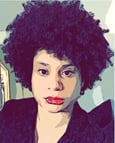
Image Description: A woman with a black curly afro. She wears a bright red lipstick and a black shirt.
1. What does access mean to you?
Accessibility is the (re)design of human culture that enables disabled people to fully participate in all aspects of human life. For me it means that I have everything I need to participate in the community because my involvement as a disabled person is valued by the community.
2. How has your AUCD traineeship made you a better ally or self-advocate?
The focus of my life and career is disability and the positive impact of disabled people on human culture. I want to improve media access for people with disabilities through my company Disability Story, which publishes podcasts, videos and writing about the disability experience. My most important access goal is the affirmation of disability identity for disabled professionals in the education and healthcare sectors. These professionals are best placed to advocate for greater access for all people with disabilities. We often do not because of a notion that disability is contrary to professional identity.
3. What are your goals for the future?
My future goals are to launch the Disability Story website and podcast. Currently I am working with the AUCD Community Education and Dissemination Council to collect and tell the network’s stories in honor of the 30th anniversary of the Americans with Disabilities Act.
4. How can what you learned as an AUCD emerging leader help you achieve those goals?
Being part of the AUCD emerging leaders community has been instrumental in helping me develop leadership skills and making contacts in the disability community.
Mariana Teposte
Discipline: Neuroscience and Cognitive Sciences
Sonoran UCEDD (AZ)
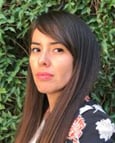 I have worked many years as a caregiver with United Cerebral Palsy of Southern Arizona. My experience with individuals range from infants to the elderly in providing in-home health care in order to maintain their independent, healthy lifestyles at home. I have worked with clients who are diagnosed with Autism, Down syndrome, Parkinson’s Disease, Cerebral Palsy, Post-Traumatic Stress Disorder (PTSD), Dementia, and various other mental illnesses. I decided to pursue my educational endeavors because I want to learn more about neuropsychiatric symptoms, cognitive impairment, symptom manifestation and development, and the intricate biomarkers that are associated with the formation of neurodegenerative diseases.
I have worked many years as a caregiver with United Cerebral Palsy of Southern Arizona. My experience with individuals range from infants to the elderly in providing in-home health care in order to maintain their independent, healthy lifestyles at home. I have worked with clients who are diagnosed with Autism, Down syndrome, Parkinson’s Disease, Cerebral Palsy, Post-Traumatic Stress Disorder (PTSD), Dementia, and various other mental illnesses. I decided to pursue my educational endeavors because I want to learn more about neuropsychiatric symptoms, cognitive impairment, symptom manifestation and development, and the intricate biomarkers that are associated with the formation of neurodegenerative diseases.
Image Description: A woman with a side swept bang and long dark brown hair that has a light ombre at the ends. She wears a black jacket with red and white flowers. She stands against a wall of green leaves.
1. What does access mean to you?
Access means people with intellectual and developmental disabilities (IDD) are an underrecognized group who suffer from health disparities. It is important to deliver complete access to healthcare services regardless of socioeconomic disadvantage and socioeconomic status.
2. How are you working to improve access for and with individuals with disabilities?
My work with the Medical Home Project from Sonoran UCEDD located in Family and Community Medicine Clinic, Banner University Medical Center, has allowed me to learn about the obstacles to quality healthcare that each IDD patient endures. I advocate for the patients I see in the Medical Home Project and develop a plan to connect patients and families to medical and non-medical community resources such as vocational services to coordination of healthcare providers to deliver comprehensive healthcare.
3. What are your goals for the future?
I want to further my understanding and commitment to the IDD population in Medicine and the Medical Home Project clinic has provided me with many opportunities to learn about how to best serve patients with IDD.
4. How can what you learned as an AUCD emerging leader help you achieve those goals?
Being an AUCD Emerging Leader has helped solidify my commitment to be a lifelong advocate for patients with disabilities by continuing to foster accessible, compassionate, and patient-family centered medicine.
Jackie Mohler
Discipline: Special Education and Behavior Analysis
The Rural Institute for Inclusive Communities (MT)
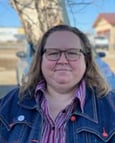 Jackie Mohler has extensive experience working with individuals with developmental disabilities ages birth through the life span. Jackie has a Master’s degree in Special Education with Advanced Studies in Applied Behavior Analysis from Montana State University-Billings and has led the way in establishing licensure for behavior analysis in the State of Montana. As a person living with Multiple Sclerosis for ten years, I enjoy every day that I’m able to strengthen community inclusion and see those with disabilities thriving.
Jackie Mohler has extensive experience working with individuals with developmental disabilities ages birth through the life span. Jackie has a Master’s degree in Special Education with Advanced Studies in Applied Behavior Analysis from Montana State University-Billings and has led the way in establishing licensure for behavior analysis in the State of Montana. As a person living with Multiple Sclerosis for ten years, I enjoy every day that I’m able to strengthen community inclusion and see those with disabilities thriving.
Image Description: A woman with blond shoulder-length hair and black square glasses. She wears a red and white striped buttoned-down shirt with a denim jacket. She stands outside with a tree and a house with a red roof in the background.
1. What does access mean to you?
Throughout centuries, people of all genders, ethnicities, orientations and social classes have fought for access - access to vote, access to sit wherever they want on the bus, access to affordable healthcare, access to marry whomever they’d like, etc. So how is it that there are still people who don’t have even basic access? To me, access means all-inclusive to the places and activities desired, regardless of gender, ethnicity, orientation, social class or ability.
2. How are you working to improve access for and with individuals with disabilities?
I’ve spent my entire professional career dedicated to improving access for individuals with disabilities. I’ve been especially focused on working with government officials, lobbyists, other disability service providers and advocates. Currently, my focus has been on the desegregation of medical benefits, habilitative services to be covered under public and private insurance and the passing of a Katie Beckett Waiver that would help children who exceed financial eligibility for essential services receive government health care support through Medicaid.
3. What are your goals for the future?
I want to protect the ground that has been gained by all the advocates who have come before me while continuing to work toward a future of inclusion. I want to maintain and increase efforts to promote inclusivity in my community through strong community collaborative systems and constantly develop new ideas and plans to increase awareness, access and inclusion. I want to keep improving the laws in Montana so those with disabilities are represented.
4. How can what you learned as an AUCD emerging leader help you achieve those goals?
My leadership skills have grown immensely with the help of AUCD. During the 2018 Atlanta Leadership Academy, I gained many foundational skills that have helped me see a clearer picture of how to support individuals with disabilities. I’ve learned how to advocate more effectively for their needs. I’ve learned the importance of listening to others and promoting that with others. Today, I consider inclusivity in every decision I make.
Hunter Matusevich
Discipline: Special Education
Kansas University Center on Developmental Disabilities (KS)
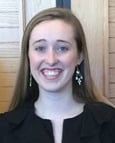 Hunter has a B.A. in psychology from Coastal Carolina University and a M.Ed in special education with an emphasis in transition services and ABA therapy from the University of Oklahoma. Currently, she is a doctoral student and UCEDD trainee at the University of Kansas, Kansas University Center for Developmental Disabilities helping with research around self-determination. Before, pursuing her PhD she worked at a clinic providing services for children with autism spectrum disorder, at an inclusive post-secondary education program for students with IDD, and at Vocational Rehabilitation providing pre-employment transition services.
Hunter has a B.A. in psychology from Coastal Carolina University and a M.Ed in special education with an emphasis in transition services and ABA therapy from the University of Oklahoma. Currently, she is a doctoral student and UCEDD trainee at the University of Kansas, Kansas University Center for Developmental Disabilities helping with research around self-determination. Before, pursuing her PhD she worked at a clinic providing services for children with autism spectrum disorder, at an inclusive post-secondary education program for students with IDD, and at Vocational Rehabilitation providing pre-employment transition services.
Image Description: A woman smiling at the camera with a big smile. She has light brown hair. She is wearing a black blouse with ruffles on the front. She has on blue and white earrings.
1. What does access mean to you?
Access means individuals are able to choose where they prefer to engage in various activities and actions with individualized supports without discrimination. Equal access does not always mean equitable access. Equal access is providing the same supports for all individuals to be able to engage in opportunities, but this does not mean they all have the same access. Equitable access, however, is providing individualized supports for individuals to be able to participate and access the same opportunities as those around them.
2. How are you working to improve access for and with individuals with disabilities?
I am working on improving access for and with individuals with disabilities through my current work at KUCDD. Currently, I am working on research projects to give students with varying support needs a voice in transition by enhancing teacher practices and providing individualized supports for equitable access in various opportunities.
3. What are your goals for the future?
After completing my PhD, I would like to educate pre-service and in-service educators to enhance their practices for transition, inclusion, equitable access, and self-determination. Also, I would like to provide training to help educators utilize individualized supports for all individuals in order to access and participate in school and the community with and alongside peers.
4. How can what you learned as an AUCD emerging leader help you achieve those goals?
Being an AUCD emerging leader has taught me to look at topics and issues from different perspectives. It has given me opportunities to expand my knowledge and skills around issues that individuals with varying support needs face and practice to help ensure these barriers are removed. The knowledge and skills I have gained so far will continue to help me investigate issues these individuals face and practices to help remove these barriers to provide equitable access not just equal access as well as better prepare future and current educators to do the same.
Sara Sorrell
Discipline: Public Health
Institute for Disability Studies: Mississippi's UCEDD (MS)
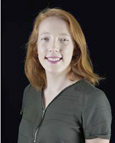 Sara studies Anthropology and Public Health with an emphasis in Epidemiology and Biostatistics at the University of Southern Mississippi. Her primary research interests are intergenerational programming, food security, and chronic disease prevention.
Sara studies Anthropology and Public Health with an emphasis in Epidemiology and Biostatistics at the University of Southern Mississippi. Her primary research interests are intergenerational programming, food security, and chronic disease prevention.
Image Description: A woman with red shoulder-length hair. She smiles at the camera with mauve lipstick. She wears a dark gray shirt with a zipper on the front.
1. What does access mean to you?
Access means different things depending on who you are. When I think of access, I think of food insecurity, because I live in Mississippi where food insecurity rates are above the national average and the highest in the nation. Twenty percent of Mississippians have poor access to good nutrition, and individuals with a disability are impacted even more.
2. How are you working to improve access for and with individuals with disabilities?
I am working to create a program that addresses food insecurity by increasing access to nutritious food for the most vulnerable of the population: elderly adults, children, and individuals with disabilities.
3. What are your goals for the future?
My goal is to turn my graduate thesis research into a full-time after school program.
4. How can what you learned as an AUCD emerging leader help you achieve those goals?
I’m a shy person with big ideas. Being an Emerging Leader for AUCD has challenged me to be more engaged and outspoken.
Kristin Dell'Armo
Discipline: Psychology
Nisonger Center (OH)
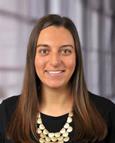 Kristin is a fifth-year student and doctoral candidate in the Intellectual and Developmental Disability Psychology Program at The Ohio State University. She is passionate about the transition to adulthood for adolescents and young adults with intellectual and developmental disabilities, and participates in both research and clinical work focused on improving outcomes in this area.
Kristin is a fifth-year student and doctoral candidate in the Intellectual and Developmental Disability Psychology Program at The Ohio State University. She is passionate about the transition to adulthood for adolescents and young adults with intellectual and developmental disabilities, and participates in both research and clinical work focused on improving outcomes in this area.
Image Description: A woman smiling at the camera. She has long dark brown hair that is lighter in color at the ends. She wears a black shirt and a gold layered necklace.
1. What does access mean to you?
Access, for me, means that people with disabilities are able to participate in all of the same kinds of meaningful life activities as people without disabilities in their communities. This goes far beyond access to physical spaces – for me, given my focus on transition-aged youth, I often think about access to competitive employment, community-based housing, and postsecondary education opportunities, as well as access to any supports/services that facilitate inclusion in these activities. I do not believe we can truly have access without including people with disabilities themselves in planning for their futures, and therefore strive to make self-advocacy a part of everything I do.
2. How are you working to improve access for and with individuals with disabilities?
My clinical work focuses on promoting employability skills and teaching adaptive skills relevant to independent living. All of this prepares the adolescents with whom I work for a meaningful life in the community. Next year, I will be working with Nationwide Children’s Hospital’s upcoming Project SEARCH program, which aims to provide employment experience – and, ultimately, jobs – to youth with developmental disabilities. Programs such as this one are critical in helping people with IDD find competitive employment. I have also researched and published on the topic of attitudes/stigma toward people with IDD, as I believe that other people’s attitudes and beliefs are a major barrier to access in our society.
3. What are your goals for the future?
I hope to work as a psychologist focused on transition-aged youth with IDD. It is my hope that I can develop meaningful programs for people in this age range that will help improve their outcomes and access to services after high school, as well as conduct research on these kinds of programs. I hope that I will be able to stay connected to the AUCD network throughout my career.
4. How can what you learned as an AUCD emerging leader help you achieve those goals?
My experiences as an AUCD trainee have already shaped so much about my values, attitudes, and goals related to disability. Through LEND, I have learned the value of working on interdisciplinary teams and including self-advocates in everything I do. I have learned how other disciplines can contribute to my own knowledge and provide important perspectives. This has led to a number of interdisciplinary collaborations in both my research and clinical activities, which I believe has enriched my work. The AUCD network has helped me to meet other people from across the country who share my interests and passions, and I am confident these connections will be invaluable to me as I advance to the next stage in my career.
Michelle Cook
Discipline: Community Engagement
Vermont LEND (VT)
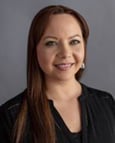 Michelle is married to her husband of 6 years and has two young children, one of whom has a disability. She holds a Master’s Degree in Criminal Justice from Boston University. She has enjoyed working with her Tribe for the past 15 years, 9 of which she worked with people with disabilities. In her spare time, she enjoys going to Comic Con, listening to audiobooks and podcasts, and running.
Michelle is married to her husband of 6 years and has two young children, one of whom has a disability. She holds a Master’s Degree in Criminal Justice from Boston University. She has enjoyed working with her Tribe for the past 15 years, 9 of which she worked with people with disabilities. In her spare time, she enjoys going to Comic Con, listening to audiobooks and podcasts, and running.
Image Description: A women with long brown hair smiling at the camera. She wears a black long sleeve shirt. She is against a gray background.
1. What does access mean to you?
Access, to me, means that all people have equal opportunity to experience all facets of life. It means equal access to transportation, digital resources, education, employment, personal goals or interests, etc.
2. How are you working to improve access for and with individuals with disabilities?
I am working within my small, rural community to pinpoint areas that lack access for individuals with disabilities and researching ways to resolve the issues.
3. What are your goals for the future?
I would like to develop ways that my organization can provide services to all of our community members regardless of their residence status (US or Canadian) and to advocate for better pay for service providers so there are enough people to provide these services. I also want to find more transportation and employment options for the community members with disabilities.
4. How can what you learned as an AUCD emerging leader help you achieve those goals?
Vermont LEND has provided me with a strong network of professionals and advocates that I can refer to when seeking information, grants, and support. I have also gained a wealth of leadership skills that I can use in creating a multidisciplinary team to make my community more accessible and provide services that are more comprehensive.
Tiffany Munzer
Discipline: Developmental-Behavioral Pediatrics
Michigan LEND (MI)
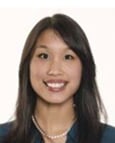 Tiffany is a Developmental-Behavioral Pediatrician who is eager to provide evidence-based care and advocacy for children with autism, ADHD, global developmental delays, and learning disabilities.
Tiffany is a Developmental-Behavioral Pediatrician who is eager to provide evidence-based care and advocacy for children with autism, ADHD, global developmental delays, and learning disabilities.
Image Description: Tiffany has a big smile straight at the camera. She has black shoulder length hair. She wears a blue collared shirt and a pearl necklace.
1. What does access mean to you?
Access in my mind means equitable engagement in the services needed to thrive in society.
2. How are you working to improve access for and with individuals with disabilities?
I’ve been fortunate enough to have received training in developmental-behavioral pediatrics, a field that is positioned at the intersection of social justice, children’s wellbeing, and advocacy for children with disabilities. As a clinician, I have the distinct joy of caring for children with autism, global developmental delays, ADHD, and learning disabilities.
3. What are your goals for the future?
My ultimate goal is to provide high-quality evidence-based care for children with autism, global developmental delay, and ADHD. Though I have had experience with working with patients on a more individual level, I am also eager to leverage training from the LEND and the AUCD network in order to exact change at a more systemic level to deliver better care to patients from diagnosis to therapies and beyond.
4. How can what you learned as an AUCD emerging leader help you achieve those goals?
Advocacy can happen on so many levels—individual, institutional, and community-based. Pediatricians are well-positioned to understand the needs of our patients; however, my patients helped me appreciate the complexity of our medical system and how many barriers patients and families experience on a daily basis. Through the AUCD network, I hope to have the chance to learn more about advocacy, create interdisciplinary collaborations, and advocate for systems-based changes to provide greater access to children with disabilities.